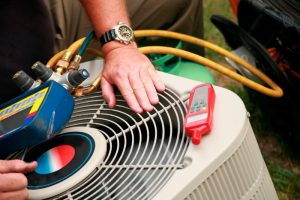 As a professional HVAC contractor, we like to remind homeowners that any problems with their air conditioning systems deserve and demand immediate attention. The longer that you let a problem go unresolved, the more likely it becomes that this problem will snowball and, eventually, wind up doing more extensive damage to your air conditioning system. In this sense, all AC issues are quite serious. Even we’ll admit that they’re not all created equal, though.
As a professional HVAC contractor, we like to remind homeowners that any problems with their air conditioning systems deserve and demand immediate attention. The longer that you let a problem go unresolved, the more likely it becomes that this problem will snowball and, eventually, wind up doing more extensive damage to your air conditioning system. In this sense, all AC issues are quite serious. Even we’ll admit that they’re not all created equal, though.
If you do have a refrigerant leak, then you are seriously going to need to have that problem resolved ASAP. All issues with your AC have the potential to do real damage, but a refrigerant leak can do it fast and can do it viciously. Give it enough time, and your refrigerant leak could even wind up doing irreversible damage to your compressor! At that point, an AC replacement is likely the next step. When it comes to all things HVAC in Colorado Springs, CO, we’re the pros to call.
Wait—Refrigerwhat?
Don’t even know what refrigerant is? That’s okay! We’re the professionals, not you, so let us shed some light on the matter. Basically, the refrigerant in your air conditioner is the heat transfer fluid. It evaporates in the indoor (evaporator) coil, and is condensed in the outdoor (condenser) coil. As it evaporates indoors, it draws heat out of the air. That cooled air is recirculated throughout the home, and the refrigerant’s heat is released as it’s condensed. This simple cycle repeats until your home is sufficiently cooled down.
What’s the Big Deal with a Low Refrigerant Charge?
And can’t I just add more? Well, a refrigerant leak is a big deal for many reasons—and no, you cannot just add more. The system does not consume refrigerant like gas in a car. It recycles it over and over again in a closed loop system. Sort of like the oil in your car, but you’re not supposed to ever need to change it.
ACs are designed to work with a specific amount of refrigerant. If yours doesn’t have enough, it means that it was either improperly charged at the time of installation—not if we did the job—or it has a leak. In either event, the system is not going to be able to cool your home effectively with a low refrigerant charge. That’s just the start of your problems, though.
The system may begin to overheat as it works harder than it should have to. That leads to short cycling, as the system shuts down prematurely in an effort of self-preservation. The coil may ice up, because it is not absorbing enough heat. This ice creates an insulating layer, which only exacerbates the problem further.
If your home isn’t cooling down enough, if your system is short cycling, if you notice ice or signs of water pooling around your indoor unit, or if you actually hear a hissing sound anywhere near the system, contact us right away. You do not want to let your refrigerant leak cause you serious trouble in the long run.
Contact Robbins Heating & Air Conditioning for outstanding AC repair services.
